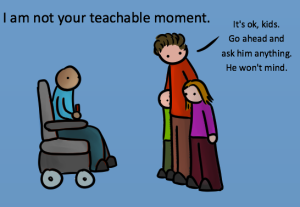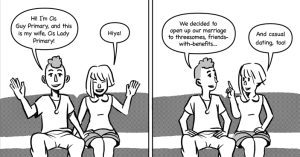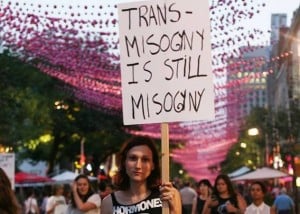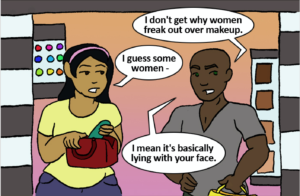I’m one of the most feminist, sex-positive and, frankly, sexually preoccupied people I know. And yet, when given the opportunity to have casual sex, I almost always turn it down.
This confused me for quite some time. The sex-positive feminist circles I traveled in taught me that you should have sex whenever you feel the physical desire to do so, and if you don’t, it’s because of internalized societal pressures.
As such, my sexual decisions have confused my friends, too. Several have tried to convince me to just “let loose a little.” One even asked, “But aren’t you all about women’s liberation?” when I said I wasn’t interested in sex outside of a relationship.
“Yes,” I told her – and that’s why I owe it to myself to make choices regarding my body that make me comfortable, even if others feel I should behave differently.
That’s what sex-positive feminism is about, after all: helping people have the sex lives that work best for them. This might mean having a lot of sex, or it might not, and both choices are equally acceptable.
Sex-positive feminism is also about consent, which means only engaging in activities that all parties involved are 100% sure they want to participate in. The same way I would never do anything with someone else without their enthusiastic consent, I refuse to do anything I’m not stoked about myself.
But why am I not interested in casual sex, specifically?
After all, I do desire and enjoy sex – a lot – and I don’t believe it’s ever wrong between consenting adults. And according to the (warped) version of sex-positivity I learned, you should have sex as long as those two conditions are met.
But that philosophy has gotten me into situations I didn’t feel good about afterward. And that’s why it’s not feminist – because it favored what I “should” do over what was actually best for me.
The bad feelings I got after casual hookups have many roots, some more problematic than others. One is that society has made me fear having “too many” sexual partners, and that’s something I’m battling – but there are other reasons.
First of all, I take time to warm up to people. Since my boundaries haven’t always been respected, I’m protective of them. I won’t even cuddle with someone unless I feel confident they won’t expect more. Sex with strangers scares me.
Plus, purely physical interactions feel empty to me. I feel disingenuous engaging in acts that I consider signs of affection with people I don’t actually feel affection toward. Hooking up with people I don’t truly know makes me feel sad, as if I’m not fully appreciating them, and it falls short of the loving, connected sexual relationships I’ve had (not that all sex has to be loving or connected).
But as a feminist and as a woman, I’m often questioned for this decision. However, I believe that you can be uninterested in casual sex and be a feminist, and neither of those things take away from each other.
So here are some of the myths I’ve run up against as a feminist woman who doesn’t engage in casual hookups – and why they actually undermine feminism.
Myth #1: We Just Need to Liberate Ourselves from Sex-Shaming
Some sex-positive feminists seem to believe that if there were no societal constraints, everyone would elect to have lots of sex with many partners. But that’s not what everyone wants from their sexuality.
Sometimes, there’s truth to the belief that women who don’t have casual sex are sex-shaming themselves. I experience a lot of anxiety around the possibility of my “number” increasing.
But that doesn’t mean that’s the only reason I’m not interested in casual sex. And even if it were, I still shouldn’t do anything that makes me uncomfortable.
There are many reasons other than sex-shaming that people might not like casual hookups. They may be on the asexual spectrum. They may have traumatic sexual pasts that make trust difficult. They may prefer stronger emotional connections.
Casual sex isn’t immoral. But morality aside, it just doesn’t work for all of us.
The belief that you must have casual sex in order to be liberated is actually anti-feminist and sex-negative because it forces people into a narrow definition of liberation rather than helping people liberate themselves on their own terms.
Myth #2: We’re Less Sexual
People sometimes assume that because I turn down hookups with people I’m not dating seriously, I have a low sex drive. I’ve had women tell me they could never do things my way because they have too big a sexual appetite.
I’ve also had people mislabel me demisexual, which means you don’t feel attracted to people you haven’t bonded with emotionally.
But my decision actually has nothing to do with that.
Because I still feel desire for people I’m not dating. I just don’t act on it.
On the other hand, when people don’t know how I conduct my sex life, but simply know I’m open about liking sex, they assume the opposite: that I must be very interested in casual hookups.
This assumption stems from the belief that women’s sexuality exists for other people. If we’re openly sexual beings, the story goes, we’re looking to please men.
The idea that women must have lots of sex to be sexual can actually encourage the notion that women can only be sexual in relation to others. It can also encourage the anti-feminist idea that outsiders get to define a woman’s sexuality, rather than the woman herself.
Feminism really says that you can be an extremely sexual person without sleeping with every interested party – or anyone – because you can be sexual on your own terms.
I may not have a lot of sex, but that doesn’t make me less sexual. I still have sexual thoughts and feelings and desires that nobody else is privy to. They belong to me, and they define my sexuality just as much as any external behavior.
Myth #3: We’re Missing Out On an Integral Part of Being an Adult
When I’ve hooked up with people I wasn’t seriously dating, I’ve expected to feel like an adult in the morning. That was what grown-ups did, after all, right? At least on Sex and the City.
But actually, casual hookups made me feel unsure of what I was doing and unable to control my physical impulses. So, basically, they made me feel like a little kid.
One thing I’ve learned as I’ve gotten older is how to parent myself.
The same way a parent might say “I know your favorite show’s on, but you need to go to bed or you won’t be a happy camper tomorrow,” I sometimes need to tell myself, “I know you want to sleep with that person, but it’ll be more trouble than it’s worth.”
That’s maturity: being the parent, not the kid.
Having casual sex doesn’t make you any more mature than staying up all night as a kid because you’re at home without a babysitter for the first time. Being a grown-up isn’t about doing “grown-up” things just because you can; it’s about not doing things that don’t make you feel good in the long-term even though you can.
And casual sex has never made me feel good in the long-term, even though I respect others’ right to engage in it.
When feminists tell other feminists how to be empowered, they’re contributing to an anti-feminist culture that treats women like children.
Sex-positive feminism should be about trusting women to be adults and figure out what’s good for them, even if it’s not what’s good for you.
Myth #4: We’re ‘Withholding’ Sex from Potential Partners
In college, I dated a guy casually for about two months. We fooled around a little bit, but didn’t go very far. It wasn’t clear whether the relationship was going anywhere, and given that he once unbuttoned my shirt after I’d told him not to, I didn’t really trust him.
But being nineteen and not the best judge of people, I was still bummed out when he ended our relationship, saying he wasn’t looking for anything serious.
Seeing how down I was and wanting to help me avoid feeling that way in the future, a family member asked me, “Well, were you intimate with him?” and explained that of course a twenty-something guy will skedaddle if he’s not getting what he wants.
And maybe that was why he ended it. But that’s a good thing. If he wasn’t open to taking things slowly, we wanted very different things and wouldn’t have been compatible in the long run.
Then there were the potential partners who gave me a hard time themselves for not sleeping with them. I’ve been called a “tease” and told I was “leading on” guys just for kissing them or hanging out in their rooms.
This has even happened with self-identified sex-positive feminists. I’ve been on dates with men who have spoken passionately against sex-shaming but had no problem prude-shaming me because my version of liberation didn’t benefit them.
Too often, women’s sexual freedom is defined as “freedom” to do what men want.
But no matter where it manifests, the belief that a woman owes sex and is therefore wrong to “withhold” it is part of rape culture.
When we decide not to sleep with someone and they’re bummed out about it, that’s their problem, not ours. And if someone wants to end a relationship over it, that’s okay because they’re not right for us anyway.
And if someone’s really sex-positive and a feminist, they won’t want anyone to do something they’re not ready for.
Myth #5: We’ve Made This Choice Because We’re Women
My biggest fear as a woman who doesn’t do casual sex is that I’ll confirm gender stereotypes.
Many people have told me there are biological reasons behind my decision that I’m just not aware of.
They’ve said that women get hormonally attached even to casual hookup partners (never happened to me), that women are more complex and require love poems and candlelit dinners to be turned on (not me), that women have lower sex drives (so not me), and that women don’t get as much out of casual sex because they’re harder to please (not quite).
But you don’t have to be a woman to decide casual sex isn’t for you. And, of course, you can be a woman and love casual sex.
Because of stereotypes like these, a lot of women feel pressure to have fewer casual hookups than they want, and a lot of men feel pressure to have more. One study found that women are as interested in casual sex as men when they know their partner will give them a good experience and they won’t be judged for it. Another study found that teenage boys feel more pressure to have sex than girls do. (These studies unfortunately did not include people who don’t identify as men or women.)
Feminism and sex-positivity have made a lot of progress in challenging the stereotype that men want to sow their wild oats and women want to settle down. But when sex-positive feminists say that a woman should sow her wild oats because she’s a feminist, as my friend did, they’re pressuring someone to represent women.
When we attribute the decision to have or not have casual sex to someone’s gender, not who they are as individuals, we reduce people to their genders, which only serves to perpetuate stereotypes.
Just as people shouldn’t have to defend their decision to have many sexual partners, they shouldn’t have to defend their decision to have few or none. We already judge women by their sex lives too much, and we don’t need more of that from within the feminist community.
Feminism should give us the option to follow or reject gender roles – not the compulsion to reject them.
***
The fight against sex-shaming and for women’s right to have a lot of sex with a lot of partners is important, but it doesn’t have to exclude or put down women who make the opposite decision. There’s no point in feminism or sex-positivity, after all, if they don’t let women make the choices they want.
As I told my friend, my identity as a feminist has nothing to do with how many sexual partners I’ve had and everything to do with how I’ve made that decision: with sole consideration for what’s best for me.
[do_widget id=’text-101′]
Suzannah Weiss is a Contributing Writer for Everyday Feminism and a New York-based writer whose work has appeared in The Washington Post, Salon, Seventeen, Buzzfeed, The Huffington Post, Bustle, and more. She holds degrees in Gender and Sexuality Studies, Modern Culture and Media, and Cognitive Neuroscience from Brown University. You can follow her on Twitter @suzannahweiss.
Search our 3000+ articles!
Read our articles about:
Our online racial justice training
Used by hundreds of universities, non-profits, and businesses.
Click to learn more





















